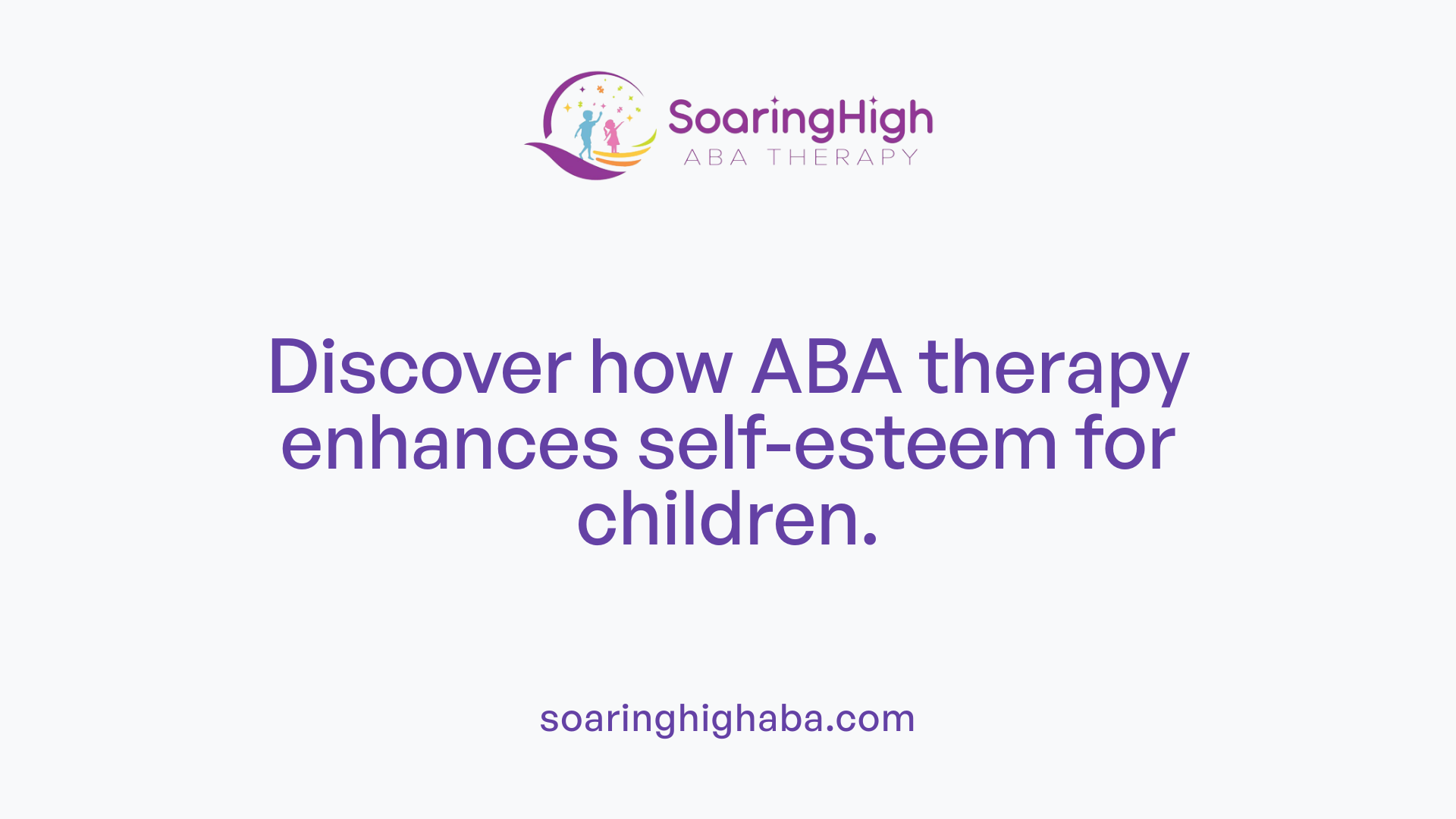Unlocking Confidence and Independence
Applied Behavior Analysis (ABA) therapy is not only a tool for behavioral intervention but a transformative approach to nurturing self-esteem and independence in children, particularly those with autism. By leveraging structured strategies and supportive practices, ABA therapy helps children build essential life skills, fostering a foundation of self-confidence crucial for their development. This guide explores how ABA therapy supports children's self-esteem journey through tailored interventions, practical tips for caregivers, and insights into the therapy's overall life-changing benefits.
The Role of ABA in Boosting Self-Esteem

How can Applied Behavior Analysis (ABA) therapy assist children with low self-esteem, particularly those with autism?
Applied Behavior Analysis (ABA) therapy is a powerful tool for assisting children with low self-esteem, especially those on the autism spectrum. This therapeutic approach emphasizes positive reinforcement techniques, which celebrate achievements—big or small—thereby fostering a sense of accomplishment and empowerment.
ABA therapy incorporates evidence-based practices tailored to each child's unique needs. This variability allows therapists to focus on essential skills that boost self-esteem, such as social interactions, communication abilities, and daily living tasks.
The concept of Neuropositivity is integral here. By creating an environment that reinforces positive behaviors, ABA encourages children to internalize self-acceptance and develop a healthier self-image. Research supports that the incorporation of positive affirmation techniques in therapy activates brain systems linked to self-esteem and learning, creating a more accepting mental framework.
In practical terms, ABA utilizes methods like Discrete Trial Training and Pivotal Response Treatment. These strategies focus on breaking down complex skills into manageable steps, enabling children to master tasks such as brushing their teeth or engaging in conversation. Each successful completion is rewarded, cultivating confidence and a feeling of independence.
Through structured routines, ABA not only supports skill mastery but also helps children manage emotions and interactions with peers. This enhanced capacity for emotional regulation is crucial for overall emotional well-being and reflects positively in their self-perception.
Ultimately, as children learn to navigate daily challenges with support and reinforcement, they build resilience and a stronger sense of self-worth, essential for a thriving life.
Core Techniques in ABA for Promoting Independence

What strategies and techniques does ABA therapy use to promote self-esteem and independence in children?
ABA therapy employs a variety of strategies and techniques that significantly aid in promoting self-esteem and independence in children, particularly for those on the autism spectrum.
Positive Reinforcement
One of the standout methods in ABA is positive reinforcement. This technique rewards children for desired behaviors, helping them to feel valued and competent. Celebrating small achievements not only boosts their confidence but also reinforces their motivation to continue striving for success.Task Analysis
Another important strategy is task analysis, where complex skills are broken down into manageable steps. For instance, teaching a child to brush their teeth can start with simple prompts and gradually lead them through the entire process. This step-by-step approach helps children internalize essential life skills, reinforcing a sense of independence as they master these tasks.Structured Routines
Structured routines provide stability and consistency, allowing children to know what to expect and encouraging responsibility. Such environment reduces anxiety and gives them a framework within which they can thrive.Self-Monitoring and Management
Self-management principles enable children to track their own behavior and emotions, fostering autonomy. This encourages self-awareness, a key factor in developing self-esteem.
By integrating these techniques, ABA therapy not only improves children's communication and social skills but fundamentally supports their journey towards independence and improved self-esteem, crucial for their overall quality of life.
Practical Steps for Parents and Caregivers

What are practical tips for parents and caregivers to support and nurture children's self-esteem using ABA principles?
Parents and caregivers play a vital role in nurturing self-esteem in children using ABA principles. Here are a few actionable steps:
Set Clear Expectations: Establish expectations for behavior and tasks. This clarity helps children understand what is required, fostering a sense of security and competence.
Use Positive Reinforcement: Acknowledge and reward desired behaviors. Celebrating even the smallest achievements boosts children's confidence, reinforcing their efforts.
Create Structured Routines: Establishing predictable routines supports children's learning. Visual aids can be particularly beneficial, helping children internalize daily tasks like hygiene and dressing.
Engage in Interest-Based Activities: Encourage participation in activities that cater to the child's interests. This promotes a sense of competence and accomplishment, enhancing self-esteem.
Celebrate Small Victories: Regularly acknowledge achievements, no matter how minor. This practice reinforces their abilities and encourages them to set realistic goals.
Involve Parents in Therapy: Participating actively in the therapy process strengthens the bond with the child. It allows parents to reinforce emotional learning and behavioral strategies at home.
Ultimately, a personalized approach that emphasizes emotional connections and recognizes individual strengths is essential for building confidence and resilience in children.
ABA Therapy: Building Essential Life Skills

What are the benefits of ABA therapy in developing essential life skills in children facing self-esteem challenges?
ABA therapy offers numerous benefits in developing essential life skills for children facing self-esteem challenges. By enhancing communication skills, children learn to express themselves effectively, leading to improved relationships and increased social confidence.
The therapy fosters independence by teaching critical self-care and daily routine skills, such as dressing, hygiene, and meal preparation. These skills not only boost self-esteem but also reduce reliance on caregivers, empowering children to take charge of their daily lives.
Structured teaching of social skills is another significant aspect of ABA therapy. Children learn to navigate social cues and engage in peer interactions, which enhances their friendships and overall social competence. This positive engagement further elevates their self-worth.
With a focus on mastery, ABA therapy uses techniques like task analysis to break down complex skills into manageable steps, making learning more achievable. The use of positive reinforcement for completed tasks celebrates achievements, no matter how small, effectively enhancing children's self-esteem.
Overall, ABA therapy equips children with the vital life skills needed for long-term success and adaptability, positively impacting their emotional well-being and confidence as they grow.
Applying ABA Techniques for Confidence Building

How can ABA techniques be effectively implemented at home or in therapeutic settings to boost children's confidence?
To effectively implement ABA techniques at home or in therapeutic settings to boost children's confidence, focus on the child's strengths and interests. This approach fosters a positive self-image and encourages active participation.
Here’s how it can be done:
Strength Observation: Parents and caregivers should observe activities that engage the child. Noting what interests them can be the basis for reinforcing positive behaviors.
Personal Strengths Books: Creating a strengths book helps children visualize and recognize their capabilities, reminding them of their accomplishments and unique traits.
Engaging Activities: Involve the child in physical activities or drama classes. Structured environments build social skills and confidence through engaging interactions.
Consistent Positive Reinforcement: Rewarding desired behaviors consistently invites children to experience success, directly contributing to enhanced self-esteem.
Supportive Environments: Craft a nurturing atmosphere where mistakes are viewed as learning opportunities, fostering resilience and confidence growth.
Ongoing Assessment: Continuously assess and tailor ABA programs to meet individual needs. This responsiveness can improve personal growth and enhance social interactions, amplifying the child’s confidence in various settings.
By combining these strategies, ABA therapy can guide children toward independence while building a solid foundation of self-esteem.
The Transformational Journey Through ABA Therapy
Holistic impact of ABA on confidence and self-esteem
ABA therapy plays a fundamental role in enhancing the confidence and self-esteem of children, particularly those with autism. By focusing on fostering independence, children learn critical life skills such as dressing and hygiene. This not only prepares them for daily living but also builds their self-worth.
Positive reinforcement is a central tenet of ABA. Celebrating even the smallest achievements encourages children to embrace milestones confidently. Activities like journaling and participating in social clubs further promote self-expression and social skills, helping children feel valued within their peer groups.
Long-term benefits for children and families
The long-term benefits of ABA therapy extend to entire families. As children become more independent and self-sufficient, the confidence they gain leads to improved academic achievement and better social interactions. Families experience reduced stress levels, as the skills learned through ABA therapy help manage behaviors and emotions effectively.
Parents also learn alongside their children, understanding the importance of modeling healthy self-esteem, which supports the entire family's emotional well-being.
Reduction of family stress
ABA therapy not only nurtures individual growth but crucially alleviates family stress. As children learn and internalize essential skills, caregivers experience increased peace of mind. Through strategies that promote independence and self-management, families develop a healthier, more supportive environment that enhances overall quality of life.
Conclusion
Supporting children with low self-esteem, especially those with autism, involves a network of carefully applied methods and tailored interventions, all of which are central to ABA therapy. This approach not only nurtures independence and essential life skills but also provides parents and caregivers with actionable strategies to reinforce children's self-confidence in everyday life. As children grow and achieve new milestones in their journey with ABA, they develop a resilience and positive self-image that empowers them to face various life challenges with grace and capability. The constructive environment fostered by ABA therapy ensures that children build a sound foundation for a healthier, more fulfilling life filled with understanding, acceptance, and achievement.
References
- ABA Therapy: Building Independence and Confidence in Kids
- How ABA therapy can help children with autism develop ...
- Tips for Developing Healthy Self-Esteem in Your Child with Autism
- 7 Surprising Benefits of ABA Therapy for Kids You Need to Know
- How To Increase Self-Confidence In Children With Autism
- Building confidence: autistic children and teenagers
- Supporting a Child in Applied Behavior Analysis (ABA) Therapy
- ABA Therapy and Emotional Development in Children




































































































